Erad Fridman is the CEO and Co-Founder of Fluxon, an agile product development company with offices in the US, India, Ukraine and Canada. Prior to Fluxon, Erad, a product leader with 15+ years of experience in developing platforms, UX, and design, led a team of Product Managers, Engineers, and Designers at Google. Erad started coding at the age of 6 and by 19, had earned both his Computer Science and Mathematics degrees. He also earned dual Masters Degrees in Finance and Business Administration at Boston College.
What does “entrepreneurship” mean to you?
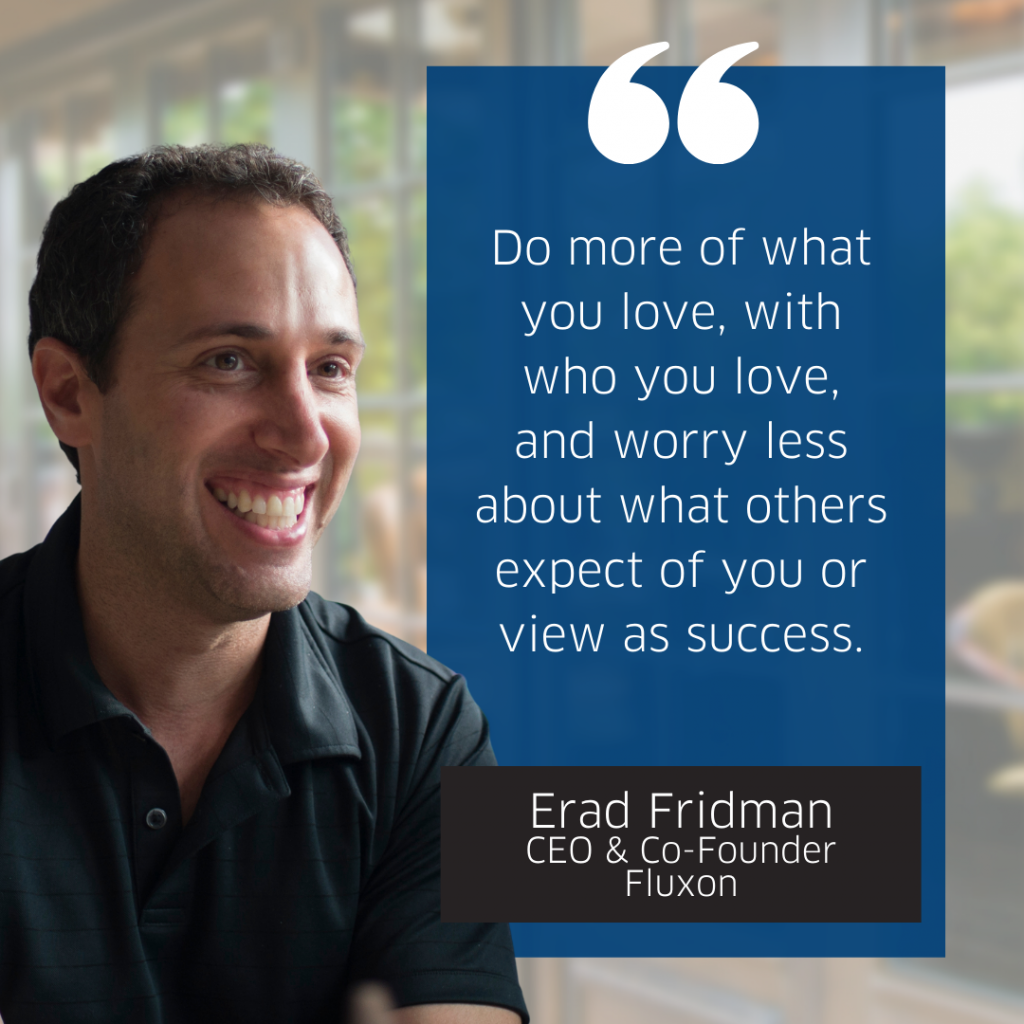 Erad Fridman: Society often evaluates entrepreneurship by the level of monetary success a person has achieved. In reality, monetary success is orthogonal: it is influenced by many factors such as goals, the market, and timing. For example, if you start a non-profit, should that mean you are less of an entrepreneur?
Erad Fridman: Society often evaluates entrepreneurship by the level of monetary success a person has achieved. In reality, monetary success is orthogonal: it is influenced by many factors such as goals, the market, and timing. For example, if you start a non-profit, should that mean you are less of an entrepreneur?
To me, entrepreneurship is about inner drive: trying something despite all the voices telling you that it’s not possible or that it may not succeed. It’s about defaulting to action, taking a risk, and problem-solving. These are characteristics that all team members can embody in any role or position of a company.
Tell us about your first experience with entrepreneurship.
EF: When I was 10 years old, my friend and I started a business selling bagels to people in our neighborhood. We had a feeling people liked bagels, and the price we could purchase them for in bulk was a lot lower than what the local bakeries were selling them for. We started buying a bunch in the morning, and then going door-to-door in the apartment buildings around us to sell them.
At that age, we had no value for our time so essentially made no money, but the lessons learned along the way were hugely valuable. We found that bagels are best the same day, so estimating how many you will sell can make a big difference. If you don’t sell all your bagels, your calculation of profit-per-unit will be off. Without realizing it back then, we were learning about logistics, finance, and customer service – skills that are still with us today.
What is your company’s origin story?
EF: Fluxon was founded in San Francisco in 2017 by a group of friends, who are all very talented in their respective fields. We didn’t have a specific product idea in mind, but we knew that whatever we built, we would have fun working on it together. Soon after, people started reaching out to us with ideas for products they needed to develop. More awesome people joined the team. As we grew, it became clear that there was a huge demand for our passion and expertise in software development.
What is the biggest reason you started your business?
EF: We started Fluxon because we wanted to create great software products together. We help our clients get their products to market faster and give them the confidence of knowing their product is in safe hands. Our vision is to build the best product team in the world. I feel confident that this is achievable because of the amazing people we work with today.
What did those early days look like and teach you?
EF: I have so many fond memories of those early days. We were doing everything ourselves so every day was different. One day I’d be an accountant, filling information into our quickbooks, the next I’d be a Product Manager, then a recruiter. I remember thinking that the degrees of freedom were huge. There aren’t any of the boundaries you get used to through schools or the corporate world. We worked with the people we wanted to work with, on projects we chose.
There were some really high moments, like signing our first contracts or when a great new team member joined. And there were some really low moments, like realizing it was time to shut down an internal product even though we’d put our all into it. These ups and downs taught us to be resilient. Even in the tough times, we can be there for each other, we can find a path through. We are fortunate to be surrounded by people who care about their work, and each other, and that’s what makes Fluxon an amazing team.
What do you wish you knew when you started? Is there anything you would do differently?
EF: Mostly I wish I knew where to focus my time and attention – which areas were critical and which were just noise. It’s something that comes with time. But although there was much to learn, discovering it all was part of the fun.
What does “success” look like for you? We’d love to hear your biggest, boldest dream? What do you think will help you achieve it?
EF: Success looks different for each person. To me, it’s not defined by external factors such as revenue, recognition, or awards. Success for me is about knowing your goals and staying true to them. Do more of what you love, with who you love, and worry less about what others expect of you or view as success.
I look back on the lives that have been changed through Fluxon and I’m proud of what we’ve built. I feel the positive impact of our business every day: we’ve helped team members overcome personal challenges or buy their first homes, and we’ve helped our clients reach important milestones and improve the lives of their users. These are the moments that really matter.
What is your superpower as an entrepreneur?
EF: I’d like to believe my strength is making a true and genuine connection with people. I find the opportunity to learn from those around me, and form meaningful relationships. Some of the strong friendships I developed while working at Google are people who are working together with us at Fluxon today.
What are your personal driving principles, your top values?
EF: Friendships matter most to me, founding a company is just part of it: an opportunity to spend more time with the people I love. I also value continuous learning. I am always trying to develop myself, and support the development and growth of those around me.
How have your personal principles and values shaped your company’s values and principles? Give us some examples.
EF: Our business is dependent on working with amazing people. As long as we attract talented, inspiring people, we will always find work. To our team members, we strive to be much more than colleagues. To our clients, we don’t want to be their agency: we act as co-founders or advisors that always have their backs. We offer them the advice that’s best for their business, even if that means not hiring us.
The work we do offers diverse opportunities to learn and grow. We’re working with emerging technologies, inspiring ideas, and new industries. We’re developing new tools and approaches that make our environment the best it can be. And we’re building our own products, to develop areas we believe in, and master our craft.
What’s it like to work alone or with your partners?
EF: Every day is enjoyable, regardless of the highs and lows, because I get to work with people I care about and can learn from.
Do you have a mentor? Tell us about what makes them valuable to you and your business?
EF: I focus on learning from those around me, whether that’s a fellow founder or a family member. In that respect, everyone is a mentor.
What role does mentorship play in your world (as a mentor or mentee)?
EF: While I don’t have a formal mentor or mentee, sharing ideas and knowledge is really important to me, and has happened more organically. At Fluxon, we share learnings in public channels so everyone can learn from each other. Externally, I regularly connect with other founders and former colleagues, to learn from each other and provide advice when helpful.
Many entrepreneurs continue to perfect their daily routines to support their work and greater vision; would you mind sharing your morning routine or a regular ritual that grounds your work each day?
EF: Our team is international, so in the morning I spend 10-15 mins catching up with the latest. Then I divide my to-dos into a) tasks I can do or respond to immediately and b) a prioritized list. Every day, I try to have one or two top tasks in my to-do list that are a must, and I focus on completing them before starting anything else.
What are you reading or have read?
EF: I really enjoy the blog Wait But Why by Tim Urban. He goes deep on different topics and adds a lot of humor. When I go running, I like to listen to podcasts about history. One of my recent favorites is Dan Carlin’s Hardcore History, with “light” episodes that are about 4-5 hours long.
Where do you go for inspiration?
EF: My friends are my main source of inspiration. I love to spend time together, discussing the world, and our hypothesis for why certain things are happening. We talk about what the future will look like across different industries – our wild ideas and predictions. These conversations give me a lot of energy.
Do you have a favorite quote, mantra, or words of wisdom to get through the tough days?
EF: There is an old wisdom that I find humbling:
Who is wise? He who learns from every person.
Who is rich? He who is happy with his lot.
Who is strong? He who controls his passions.
Who is honored? He who honors others.
What is a problem that keeps you up at night?
EF: A question I spend a lot of time thinking through is: How can we keep the unique and special culture as we have in our company today, as we continue to grow and scale?
How do you think about helping others through your work?
EF: As a service company, we exist to help others. Every day, we think about how to best help our customers achieve their goals or find solutions to their challenges. We’re often the core tech organization for our clients, so we place huge focus on doing the absolute best job we can to support them.
We are also helping each other grow and develop as a team. We work hard on building a culture that supports continuous learning and gives people the opportunity to do the best work of their careers.
What advice do you have for fellow (and aspiring) entrepreneurs building and leading teams?
EF: Spend all your time on your team. Hire the right people. Make it a great place for them to work. At the end of the day, that’s all that really matters.
What kind of an entrepreneur do you want to be known as – as in, what do you want your legacy to be?
EF: We want our company to be known as the company where highly-talented individuals can express their full potential. We have an incredible team today and hope we can continue to attract like-minded folks that are looking for a unique company where they can hone their skills. If we do it successfully, we will be the first and only choice for our customers to build their most important products.
Do you have someone you’d like to nominate to be profiled in our Faces of Entrepreneurship series? Please let us know by emailing media@thecenter.nasdaq.org or submit your nomination using this form.
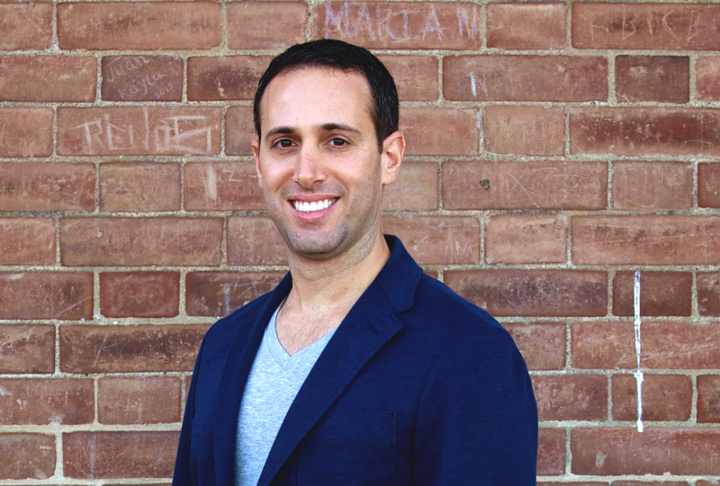
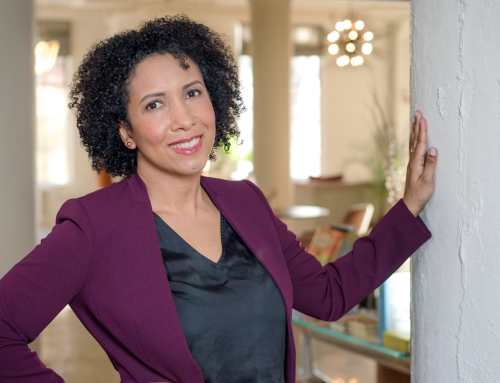
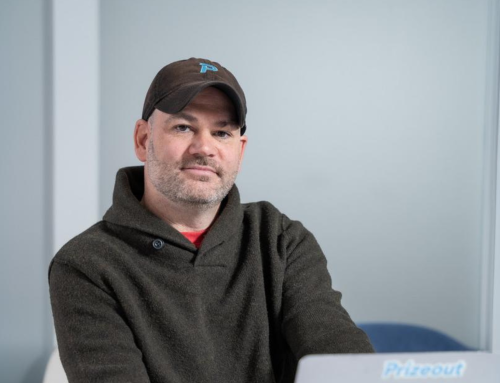
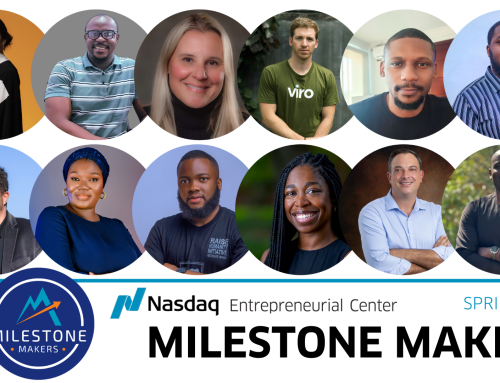
Invite a Friend
Close